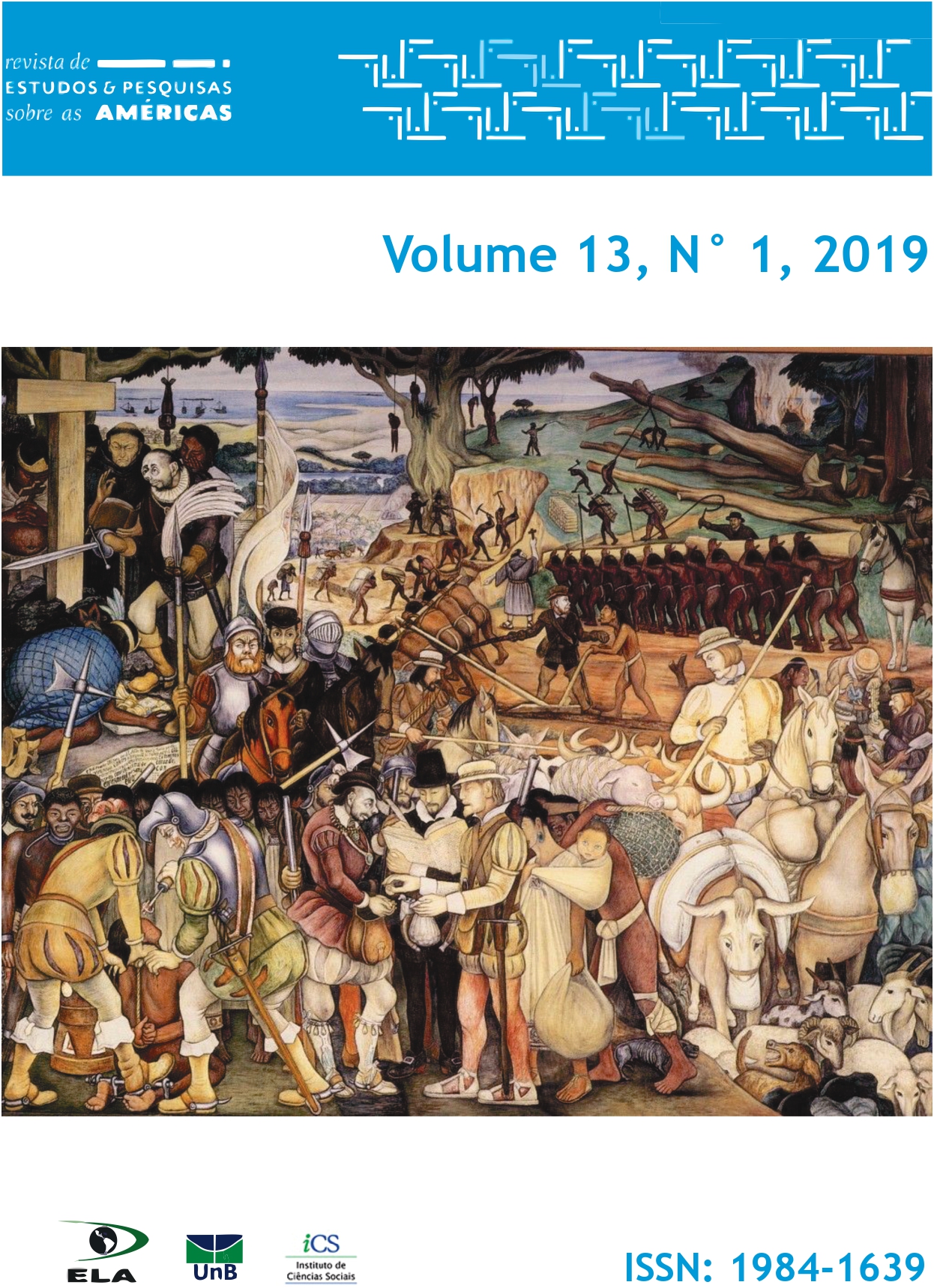La Migración Venezolana en Brasil: crisis humanitaria, la desinformación y aspectos regulatorios
DOI:
https://doi.org/10.21057/10.21057/repamv13n1.2019.24297Keywords:
Venezuelan immigration, humanitarian crisis, migration policies, Brazil.Abstract
The political, social and economic crises that come affecting Venezuela, and intensified in the second half of the current decade, put international migration as an alternative to survival for about 2 million of Venezuelans, with Brazil being one among the many of the targets of these migrants. This serious situation eventually translates into a real humanitarian crisis. From that look, the purpose of this article, to understand these movements as forced labour migration, faced with the shortage of references, It was resorting to journalistic material, some results of statistical surveys conducted field and administrative records to get an overview about the trajectory and insertion of these immigrants in the target society, pointing out how the misinformation spread by local authorities, increased volumes of migratory flows, served to create a negative image of immigrants, generating some episodes of aggression. All this against a background of lack of coordination between the federated entities in the conduct of appropriate migration policies.
Downloads
References
NOTICIAS. Disponível em: http://800noticias.com/especial-el-mapa-de-la-oleada-migratoria-de-los-venezolanos-que-huyen-de-la-crisis. Acesso em 07/10/2018.
BRASIL Ministério da Justiça. Portaria Interministerial nº 9, de 14 de março de 2018. Disponível em: https://lex.com.br/legis_27624738_PORTARIA_INTERMINISTERIAL_N_9_DE_14_DE_MARCO_DE_2018.aspx. Acesso em: 11/10/2018.
BRASIL Presidência da República. Decreto 9.199, de 20 de novembro de 2017. Disponível em: https://presrepublica.jusbrasil.com.br/legislacao/522434860/decreto-9199-17. Acesso em: 15/10/2018.
BRASIL Presidência da República. Lei 13.445, de 24 de maio de 2017. Disponível em: http://www.planalto.gov.br/ccivil_03/_ato2015-2018/2017/lei/L13445.htm. Acesso em: 15/10/2018.
BRASIL Ministério do Trabalho, Conselho Nacional de Imigração, Resolução Normativa nº 126. Disponível em: http://migramundo.com/cnig-reedita-concessao-de-residencia-temporaria-de-migrantes-de-paises-fronteiricos-ao-brasil/. Acesso em: 15/10/2018.
COLOMBO, Silvia. Êxodo da Venezuela se distingue de outros da região por volume e rapidez. Disponível em: https://www1.folha.uol.com.br/mundo/2018/09/exodo-da-venezuela-se-distingue-de-outros-da-regiao-por-volume-e-rapidez.shtml. Acesso em:07/10/2018.
DEPARTAMENTO de Polícia Federal Sistema Nacional de Cadastro e Registros de Estrangeiros (SINCRE), 2018. MICRODADOS. Disponível em: http://obmigra.mte.gov.br/index.php/microdados. Acesso em: 15/10/2018.
G1 ONU diz que quase 2 milhões de pessoas deixaram a Venezuela desde 2015. Disponível em: https://g1.globo.com/mundo/noticia/2018/10/01/onu-diz-que-quase-2-milhoes-de-pessoas-deixaram-a-venezuela-desde-2015.ghtml. Acesso em: 15/10/2018.
G1 Mais de 104 imigrantes em Roraima são repatriados com apoio da igreja venezuelana: terão comida e emprego. Disponível em: file:///G:/1.Backup_PC/TADEU/ARTIGOS/PUC_LIMA/Textos/Mais%20104%20imigrantes%20em%20Roraima%20são%20repatriados%20com%20apoio%20de%20igreja%20venezuelana_%20'terão%20comida%20e%20emprego'%20_%20Roraima%20_%20G1.pdf. Acesso em: 15/10/2018.
G1 Mapeamento aponta que 25 mil venezuelanos vivem em Boa Vista, diz prefeitura. Disponível em: https://g1.globo.com/rr/roraima/noticia/mapeamento-aponta-que-25-mil-venezuelanos-vivem-em-boa-vista-diz-prefeitura.ghtml. Acesso em: 15/10/2018.
IBGE, Estimativas da população residente para os municípios e para as Unidades da Federação com data de referência de 1º de julho de 2018. Disponível em: https://biblioteca.ibge.gov.br/visualizacao/livros/liv101609.pdf. Acesso em:15/10/2018.
JUBILUT, Liliana L., MADUREIRA, André L. Os desafios de proteção aos refugiados e migrantes forçados no marco de Cartagena + 30. REMHU - Revista Interdisciplinar da Mobilidade Humana, vol. 22, núm. 43, julho-dezembro, 2014, pp. 11-33.
MILESI, Rosita. Refugiados e migrações forçadas:: uma reflexão aos 20 anos da Declaração de Cartagena Disponível em: http://www.justica.gov.br/central-de-conteudo/estrangeiros/art_irmarosita.pdf/view. Acesso em 07/10/2018.
OBMIGRA Relatório Admissões e Demissões. Disponível em: http://obmigra.mte.gov.br/index.php/admissoes-e-demissoes. Acesso em: 15/10/2018.
OBMIGRA Relatório Relação Anual de Informações Sociais (RAIS). Microdados. Disponível em: http://obmigra.mte.gov.br/index.php/microdados. Acesso em: 15/10/2018.
OIM/MDH DTM Brasil nº1 O Monitoramento do Fluxo Migratório Venezuelano. Disponível em: https://robuenosaires.iom.int/sites/default/files/Informes/DTM/MDH_OIM_DTM_Brasil_N1.pdf. Acesso em: 15/10/2018.
SILVA, João C. J. et al. Os fluxos migratórios mistos e os entraves à proteção aos refugiados. REBEP - R. bras. Est. Pop., Belo Horizonte, v.34, n.1, p.15-30, jan./abr. 2017.
SIMÕES, Gustavo F. Perfil sociodemográfico e laboral da imigração venezuelana no Brasil. Gustavo da Frota Simões (organizador). Curitiba: CRV, 2017. 112 p.
Downloads
Published
How to Cite
Issue
Section
License
The published material is the property of the Journal, and may be reproduced in whole or in part with indication of the source.
Copyright: Authors will be responsible for obtaining the copyright of the material used. Authors who publish in this journal agree to the following terms:
a)Authors retain the copyright and grant the journal the right of first publication, with the work simultaneously licensed under
the Creative Commons Attribution License which allows the sharing of work with acknowledgment of authorship and initial publication in this journal.
b) Authors are authorized to take additional contracts separately, for non-exclusive distribution of the version of the work published in this journal (eg, publish in institutional repository or as a book chapter), with acknowledgment of authorship and initial publication in this journal.
c) Authors are allowed and encouraged to publish and distribute their work online (eg in institutional repositories or on their personal page) at any point before or during the editorial process, as this can generate productive changes as well as increase the impact and the citation of the published work (See The Effect of Free Access).
















